Brexit Brief Newsletter
1 March 2021
Welcome to the 1 March 2021 newsletter
The Joint Committee met last week to discuss outstanding issues around the Protocol on Ireland/Northern Ireland. MPs and MLAs heard evidence on the Protocol from business representatives, trade experts, and Executive Office junior Ministers. The deadline for ratification of the EU-UK Trade and Cooperation Agreement has been extended until the end of April. Minister for Agriculture Gordon Lyons has said he has asked his officials to stop work on permanent Border Control Posts.
Joint Committee meets to discuss Protocol
European Commission Vice President Maroš Šefčovič and UK Chancellor of the Duchy of Lancaster Minister Michael Gove co-chaired a meeting of the Joint Committee on 24 February. The Joint Committee oversees the implementation of the Withdrawal Agreement and Protocol on Ireland/Northern Ireland. The Committee met to find solutions to outstanding issues following weeks of political tension and trade friction. Gove and Šefčovič had previously exchanged letters, the former requesting long extensions to the grace periods, and had engaged with Northern Ireland’s First and deputy First Ministers, business representatives, and civil society. The meeting did not result in an agreement on extensions to the grace period or additional flexibilities.
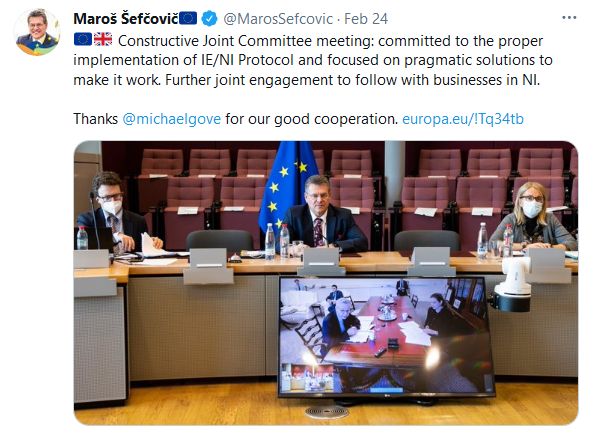
Maroš Šefčovič remarks following the meeting | Source: Twitter
A joint statement was published following the meeting, where the EU and UK “acknowledged the importance of joint action to make the Protocol work for the benefit of everyone in Northern Ireland” and the parties restated their commitment to the Good Friday Agreement and “the proper implementation of the Protocol”. There will be further engagement between business groups and stakeholders, and the EU and UK. The Committee is to meet again before the end of March “to provide further steers and where appropriate approvals.”
The meeting was attended by First Minister Arlene Foster and deputy First Minister Michelle O’Neill. Foster said the meeting was “hugely disappointing”, while O’Neill called the discussions “constructive” and “pragmatic”.
Today Lord Frost takes over from Gove as co-chair of the Joint Committee.
Westminster debate
The petition “Trigger Article 16. We want unfettered GB-NI Trade” led by First Minister Arlene Foster was debated virtually on Monday 22 February; several MPs from Northern Ireland took part. Jeffrey Donaldson (DUP) outlined his view on the problems with the Protocol, saying “we need the UK Government to act”. Colum Eastwood (SDLP) said “we have to resolve [the issues] through the protocol, because there is no alternative”. Robin Walker, Minister of State for Northern Ireland, outlined the work the government is doing to try and mitigate the issues, saying “We want to use [the Joint Committee] process with the EU to find solutions to the issues that are faced”.
The UK Government’s response states the Protocol “must be given effect in a pragmatic and proportionate way: one which effectively implements the guarantee in the Protocol itself of unfettered access from Northern Ireland to the rest of the United Kingdom, and which maintains the effective flow of trade from Great Britain to Northern Ireland.”
Assembly debate
On Tuesday 23 February the Assembly debated and passed a Private Members' Motion on North/South and east-west trade, noting the new trading reality as a result of the end of the Brexit transition period. The motion calls on the Executive “to develop an overarching economic strategy, including the establishment of an Executive subcommittee on the economy, to give a clear vision and direction to our representative agencies”.
Business representatives at the Committee for Economy
At a meeting of the Northern Ireland Assembly’s Economy Committee on Wednesday, business representatives outlined the need for the grace periods to be extended – not to ‘kick the can down the road’ but in order for proper trading systems to be developed to deal with the new trading reality. Business is asking for stability, certainty, simplicity and affordability when it comes to the new arrangements.
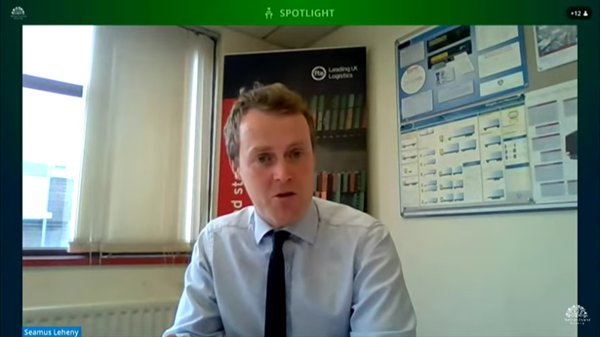
Seamus Leheny of the Logistics UK speaking to the Committee | Source: NI Assembly
Business representatives had previously met with Maroš Šefčovič and Michael Gove. Aodhán Connolly of the NI Retail Consortium stated that Šefčovič agreed that a new trading system is not in place, ready for the end of the grace periods. Connolly felt the meeting was pragmatic and that there was a greater understanding and acknowledgment of the issues. He said that the leaders have agreed to consider establishing a consultative body for NI business.
Seamus Leheny of Logistics UK told the Committee that HMRC is working on a new IT system for parcel operators but this would only be ready in Q4 of this year. He argues there is a case for an extension of the grace period for parcels GB-NI to reflect this. Leheny explained how the issues around groupage - mixed food consignments - were being resolved by sealing each pallet, but noted such a system is cumbersome and means increased checks. He pointed out that trailers are still being brought back to NI empty, as they struggle to find loads to bring back from GB, and that difficulties at Dublin port mean traffic is down around 50%. IT systems there have been unable to cope at times.
Minister Lyons on implementation of Protocol
On Friday evening PA reported that Minister for Agriculture, Environment and Rural Affairs Gordon Lyons said he has told his officials to stop construction of permanent Border Control Posts at NI ports and the recruitment of additional staff.
Following the report Ministers Nichola Mallon, Conor Murphy and Naomi Long wrote under the three minister rule to request an urgent meeting of the Executive, saying “This controversial and cross cutting matter requires the Executive to meet as a matter of urgency.” The Executive did not meet over the weekend and no official statement on the matter has been released.
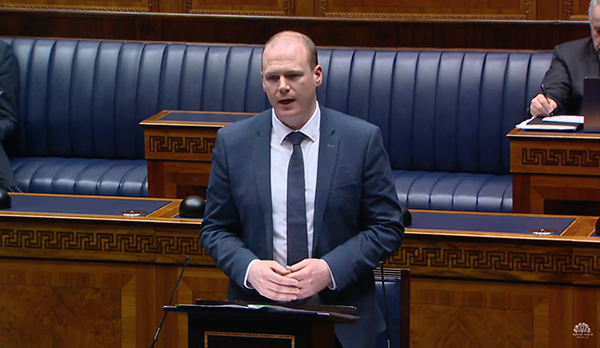
Minister Lyons speaking to the Assembly in February | Source: NI Assembly TV
Shadow Secretary of State for Northern Ireland Louise Haigh MP said the unilateral move would cause "uncertainty businesses and communities cannot afford". A spokesperson for the UK Government said: "This is a matter for the Northern Ireland Executive. We remain in close contact with them."
Lyons will be taking questions from MLAs in the Assembly on Tuesday and we can expect this issue to be raised. You can watch the session at https://niassembly.tv/ On Thursday, DAERA Permanent Secretary and Chief Vet will attend the Committee for Agriculture, Environment and Rural Affairs to discuss the matter.
Trade experts discuss the Protocol
Trade experts gave evidence to the Northern Ireland Affairs Committee on Wednesday. Northern Ireland’s new position in relation to EU and UK Free Trade Agreements was discussed. MPs heard that NI should be able to benefit to a large degree from future UK FTAs, however there are questions over imports, as in this case the Protocol also applies. David Henig, UK Trade Policy Project, pointed out that a clause in the UK-Japan FTA says that if there is a clash between this agreement and the Protocol, the Protocol would have to take priority. He sees the inclusion of the clause as a “precaution” from the UK Government.
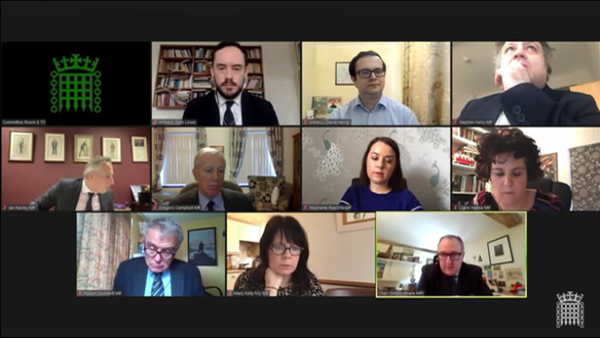
Trade experts speak with the Commons Committee | Source: UK Parliament
The issue of steel tariffs on imports to Northern Ireland was also raised. Sam Lowe of the Centre for European Reform explained the issue:
“It is a convergence of lots of different actions. It is the fact that the EU introduced safeguard tariffs, as you mentioned, as a result of the steel trade war—a 25% tariff on anything that is not within quota. It then introduced in-country quotas, so you have a UK-specific quota up to a certain tonnage that can enter the EU tariff free. That’s fine. You then have the EU import quota regulation, which exempted Northern Ireland from being able to take advantage of the EU’s country-specific tariff rate quotas, which means that steel entering Northern Ireland would not count towards any EU tariff rate quota that would allow you to dodge the safeguard. You then have the “at risk” test within the protocol, which states that if a product is subject to a trade defence instrument then it is automatically deemed as being at risk. The convergence of all of these issues means that steel entering Northern Ireland from Great Britain is considered at risk—so it is subject to tariffs—and can’t take advantage of the tariff rate quota afforded to the UK in the first instance, because Northern Ireland isn’t allowed to make use of the EU’s tariff rate quotas.”
He pointed out a solution is being worked on whereby NI could be included in the UK’s country-specific quota, but that this would not resolve all issues. On Friday, the European Commission initiated an investigation on whether the steel safeguard measure should be prolonged. The measure was introduced in July 2018.
Asked about the future of the Protocol, Henig said “there is scope for varying ways to ease things or to make certain minor changes, but it seems to me that there will have to be some sort of framework…I suspect the protocol is the framework for it.” Lowe suggested it could be improved with UK SPS integration to remove the most burdensome checks, and expansion of the ‘at risk’ profile to cover other areas. He pointed out, “many member states really do believe this argument that Northern Ireland has the best of both worlds”. Esmond Birnie, Senior Economist at the Ulster University said, “In a sense, that [flexibility from the EU] would make the working of the protocol more palatable, but there would still be some frictions. Therefore, I think there is still a very strong argument, in principle, to say that the protocol per se is objectionable”.
Junior Ministers brief MLAs on EU Exit work
Junior Minister Declan Kearney and Gary Middleton gave evidence to the Committee for the Executive Office on Wednesday.
Kearney stated that trade volumes through NI ports have returned to levels comparable to that of last year. He emphasised it is important for Northern Ireland to be represented appropriately in the governance structures of the Trade and Cooperation Agreement and Withdrawal Agreement.
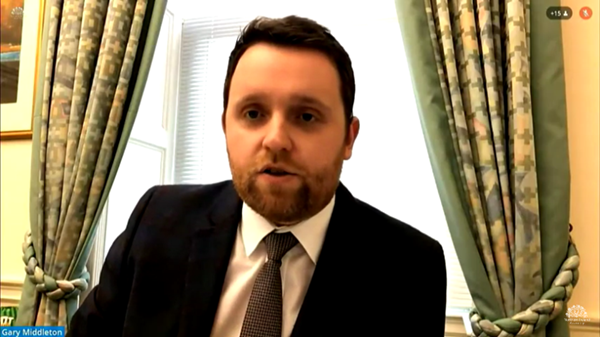
Junior Minister Gary Middleton speaking to the Committee | Source: NI Assembly
Middleton, who has taken over the role from Gordon Lyons, who is now Minister for Agriculture, Environment and Rural Affairs, noted he is pleased to see new guidance on groupage which has been developed by Defra, DAERA and industry. He noted concerns about new health certificates which will be required and that there may not be sufficient veterinary capacity for the Export Health Certificates which could have a potential impact on choice and cost of food.
Brexit business in Brussels
The UK Government has agreed to the EU’s request to extend the provisional application period of the Trade and Cooperation Agreement until 30 April.
RTÉ reported on Friday that a ‘major reset’ in relations with the UK is being considered by the EU, to coincide with the formal ratification of the TCA at the end of April. Work would be undertaken on a “package of solutions” to address the outstanding issues relating to the Protocol on Ireland/Northern Ireland, and other issues such as the diplomatic status of the EU’s delegation in London. The report states that some have seen the appointment of David Frost to his new role overseeing the UK’s relationship with the EU “as reflective of a dynamic that could be more about confrontation than co-operation”. A “handshake” moment is envisaged, which “would symbolically mark a new, more harmonious era in relations”. RTÉ understands tentative discussions are being held between senior officials in the UK and EU.
Michel Barnier attended his last Coreper (Committee of EU27 ambassadors to the EU) meeting and General Affairs Council on Brexit. He thanked member states, saying “our unity was unshakeable.” Politico reports that Barnier, who led the negotiations with the UK on behalf of the EU, had some advice for diplomats: avoid errors, stay vigilant, and don’t be so Brussels – “He urged EU countries to try and understand why 52 percent of Brits voted Leave in the 2016 referendum in the first place, suggesting regular people were concerned “Brussels” wanted to take their lifestyle or traditions away.”
Vice-President Maroš Šefčovič attended the General Affairs Council in Brussels on 23 February where he said “We will continue to keep a watchful eye over the proper application of this Agreement” and reiterated the EU’s commitment to the Withdrawal Agreement and Good Friday Agreement, stating “We are therefore open to pragmatic and flexible solutions to facilitate the implementation – in line with the Protocol and EU law.”
Other news
- The Specialised Committee on citizens’ rights met on 23 February. The Committee was established by the Withdrawal Agreement to oversee the implementation of the agreement on citizens’ rights, which protects EU nationals in the UK, and UK nationals in the EU. A joint statement was released, noting the meeting gave particular focus to “the resolution of issues affecting exercising and evidencing rights since the beginning of the year, as well as frontier workers and social security.”
- On Monday 22nd February, Secretary of State for Northern Ireland Brandon Lewis spoke with civic society in Northern Ireland to understand their experience of the Protocol and “to highlight the UK Government’s commitment to address pressing concerns.”
- Accessible Travel NI has published updated guidance on travelling with assistance dogs after Brexit. Since 1 January, new arrangements are in place for pet travel but regulations differ depending on whether you live in Great Britain (England, Scotland and Wales) or in Northern Ireland.
- The European Research Group, a group of eurosceptic Conservative MPs has published a report concluding that the Protocol "has had a profound and negative effect”. It suggests there is an alternative – mutual enforcement. Professor Katy Hayward points out that such a system, which implies cooperation and tough action, is not viable in practice, and would mean that neither the EU or UK would be properly managing their external borders.
This Week at the Assembly
- Tuesday 2 March, 2 pm - Plenary - Question Time: Agriculture, Environment and Rural Affairs
- Wednesday 3 March, 10.05 am - Committee for Economy - Invest NI & InterTradeIreland Briefing on EU Exit & NI Protocol; EU Exit Regulation
- Wednesday 3 March, 3:15 pm - Committee for Finance - Public Procurement Common Framework: RaISe Oral Briefing; Construction Employers’ Federation oral briefing
- Thursday 4 March, 12.30 pm - Committee for Agriculture, Environment and Rural Affairs - Legislation relating to EU Exit
- Thursday 4 March, 2 pm - Committee for Justice - Legislation relating to EU Exit
Catch up with the Committees
- Monday 22 February, 12 pm – Plenary - EU Exit-related legislation; Question Time: The Executive Office
- Tuesday 23 February, 3.15 pm – Plenary - Private Members’ Motion: North-South and East-West Trade
- Wednesday 24 February, 11.05 am - Committee for Economy - FSB, Logistics UK, NI Retail Consortium & Retail NI Briefing - EU Exit and NI Protocol; ESF Succession Project -Departmental Written Briefing
- Wednesday 24 February, 2.55 pm - Committee for Finance - Public Procurement Common Framework - Oral Evidence from Construction Employers' Federation
- Wednesday 24 February, 3.00 pm - Committee for The Executive Office - Oral evidence session with Junior Ministers on Brexit issues
- Thursday 25 February, 11.15 am - Committee for Agriculture, Environment and Rural Affairs - Implications of EU Exit and impact of TCA on SRs - Oral Evidence from DAERA; EU Transition Update - Written Briefing from DAERA




